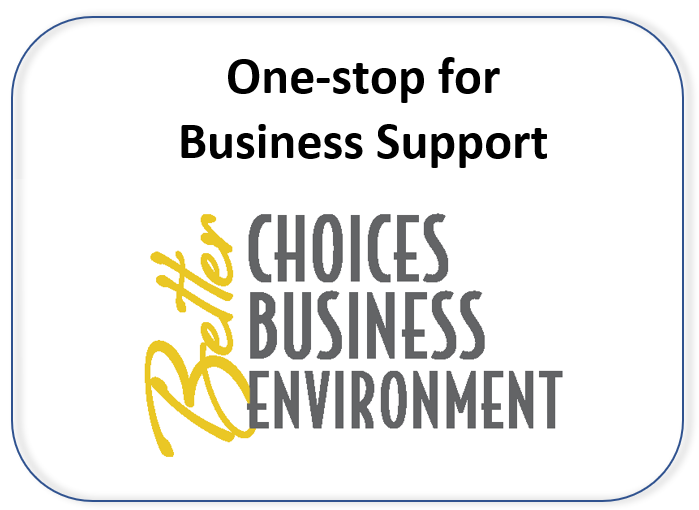Small business and workplace recycling
Businesses are required to follow recycling regulations. Recycling keeps banned materials out of landfills, saves energy costs, reduces emissions and may save businesses' money. Many tools, links and resources are available on this website to assist businesses with recycling information and regulations.
Laws and requirements
Wisconsin's commitment to reduce, reuse and recycle is shown by its comprehensive recycling law. A summary of the law can be found at Wisconsin Waste Reduction and Recycling Program (WA-222).
The laws ban certain materials from landfill disposal as well as the incineration of certain materials, playing to all residential and nonresidential locations. For a list of banned materials, see Wisconsin Recycles (WA-1574).
Businesses and other workplaces must recycle designated materials, as well as provide for the recycling of these materials by their clients or customers. Business and workplace recycling is also enforceable under local recycling ordinances implemented by the responsible unit (RU).
Getting started
Beyond a legal requirement, Wisconsin businesses and other workplaces can save landfilling costs, earn money from the sale of materials and help Wisconsin's economy and environment by recycling.
Wisconsin Recycling Means Business (WA-1000) has profiles of Wisconsin companies and nonprofits that benefit from recycling or recycled materials.
Reducing, reusing and recycling plastic bags and wrap
Businesses across Wisconsin can also reduce, reuse and recycle plastic bags, packaging and film while taking the opportunity to build profits and create jobs. Industrial or commercial shrink wrap used in business packaging can be recycled and is in high demand by industry and manufacturers as a raw material feedstock. Recycling clean, dried plastic shopping bags, newspaper bags, wrap packaging and other plastic film ensures that we continue to make full use of materials while conserving energy and keeping bags and wrap out of our landfills, streets and natural environment. By recycling wrap and spreading the word, businesses can lead the way for their communities and help create Wisconsin jobs.
Materials banned from landfills
Recycling electronic waste (e-waste)
Many common electronic devices used by businesses are banned from disposal in a landfill or an incinerator under Wisconsin's electronics recycling law (2009 Act 50). DNR's publication Managing Used Electronics (WA-420) provides an overview of the types of electronics covered under the ban and how to deal with them. It also includes information on how to select a reputable recycling vendor. It is important to ensure a recycler taking your e-waste will handle it properly. If your E-waste is not handled properly, you may become responsible for any necessary clean-up.
Most other electronics not under the ban must be reused, recycled or managed as hazardous waste. You may only send non-banned materials to an incinerator or landfill if you are able to demonstrate that the devices do not have any components exhibiting characteristics of hazardous waste. Recycling tends to be the easiest way to handle used business electronics
There are Green Tier facilities that recycle electronic wastes:
It is also important to properly dispose of other banned waste, including batteries and light bulbs. See proper handling of used batteries and recycling light bulbs for details on handling these items.
More detailed information on electronics recycling can be found at how to recycle electronics in Wisconsin.
Note: If you are thinking of starting a business that would process e-waste, contact the DNR for site and process-specific requirements that may apply at DNRWAe-cycling@wisconsin.gov or 608-234-0533.
Other recycling resources
For information on additional banned materials from old tires to waste oil, check out the DNR's what to recycle in Wisconsin page.
Businesses using aerosol cans may want to recycle empty cans for their metal scrap, however Wisconsin has specific management practices that must be followed. Review the publication Aerosol Cans: Guide to Handling and Disposal for Business (WA-1784).
Collection methods
Local units of government, called responsible units or RUs, implement and enforce municipal recycling programs to ensure that businesses comply with state and local recycling requirements. To find a particular RU, take a look at this comprehensive RU contact list.
Be sure to also check out the Wisconsin Recycling Markets Directory to discover information about outlets for recycling various materials in Wisconsin. Users can search our list of recyclers for various materials, view information about the recyclers and suggest additional recyclers to include in the listing.
Businesses are required to collect and store recyclables separately from other waste materials at the workplace. Waste haulers must keep recyclable and waste material separate during collection. Depending on volume, businesses may collect their recyclables in carts or dumpsters in a single stream, dual stream or multi-stream collection system.
Learn more about finding and working with a waste hauler to recycle all required materials and to develop a customized recycling program for your business to ensure maximum efficiency.
Haulers have requirements
It is important to note that when working with recycling haulers, companies should know that the DNR's hauler notification rule, s. NR 502.06, Wis. Adm. Code, requires licensed waste haulers collecting municipal solid wastes and recyclable materials to notify their clients of the need to comply with state and local recycling laws. This requirement ensures all waste generators and haulers are aware Wisconsin's recycling laws apply equally to all residential and nonresidential facilities, even if waste and recyclables are hauled out of state.
| Additional resources | |
|---|---|

